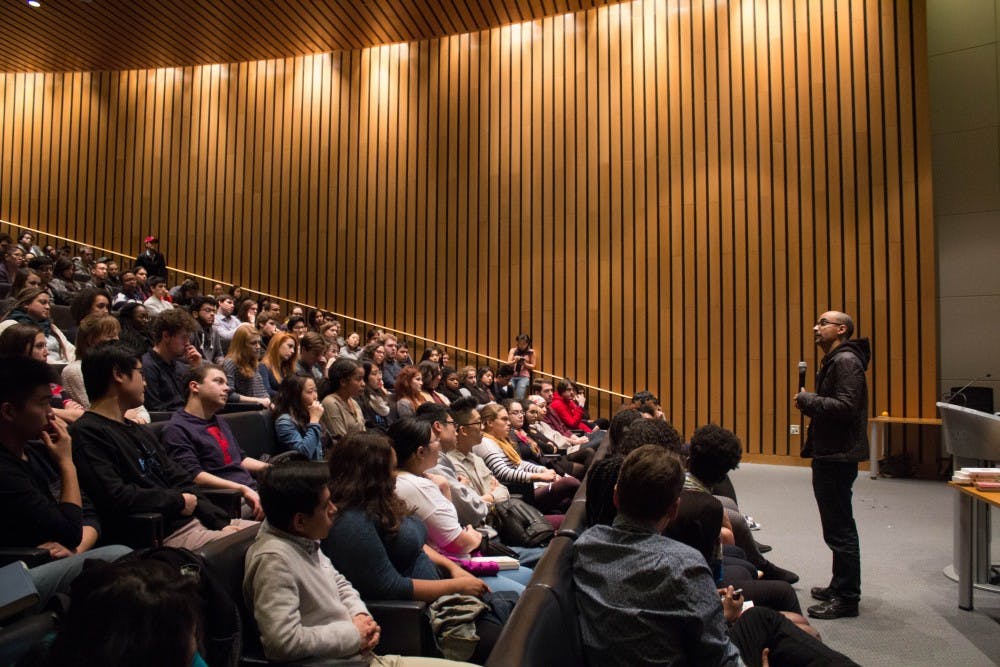
Pulitzer-prize winning Junot Diaz spoke as part of Unity Week hosted by United Minorities Council at Penn.
Credit: Lulu WangTo cap off Unity Week with a strong finish, the United Minorities Council at Penn hosted Pulitzer Prize-winning and critically-acclaimed author Junot Diaz. His talk was the culmination of a week-long series of events that aimed to start discussion about the various political happenings of the world as well as to foster a sense of unity between all groups on campus.
In addition to Diaz’s talk, the UMC held a different event every night this past week to celebrate Unity Week in the Penn community. Unity Week had a kick-off event on Nov. 12 called “Demystify Me,” a photo campaign which shed light on stereotypes associated with various groups of Penn students.
Beginning Monday, the club held a “Mural & Munchies” event to create a mural portraying the themes of the week. It then held a “Penn in Philly” discussion to discuss how Penn’s relationship could be strengthened with West Philadelphia. Wednesday marked the screening of “Waste Land,” a documentary about the men and women on the outskirts of Rio de Janeiro, Brazil, which hosts one of the largest “waste lands” in the world. In collaboration with The Race Dialogue Project and Penn Monologues, the UMC also held an open mic night to talk about race and other issues.
The whole week culminated with a discussion with Diaz, an immigrant author who won a Pulitzer Prize for Fiction in 2008 for “The Brief Wondrous Life of Oscar Wao” and is known for being a 2012 MacArthur Fellow.
The discussion with Diaz immediately began on an open note, as Diaz asked the audience where they were from, engaging many people in conversation about their hometowns. Diaz himself is from the Dominican Republic, where he lived for the early years of his childhood before immigrating to New Jersey.
Having earned a degree in English from Rutgers University, Diaz had been immersed in reading and writing from a young age, propelling him towards the arts. However, as Diaz mentioned during his talk, he believes that the arts have become more commercialized since he was studying them, which has made life harder for the artists. “Professionalization of art has gone hand in hand with extraction of money,” he said, meaning that the more commercial art becomes, the more artists are exploited.
Diaz also talked about the idea of conformity and staying within the lines, acknowledging that both were foreign concepts to him. However, Diaz acknowledged that in certain situations and roles, such as his role as a creative writing professor at the Massachusetts Institute of Technology, it is important to dedicate ourself to our job and give ourself completely to ensuring our own success, as well as that of others. However, Diaz added that “you can do it with your own style.”
But if people question it — “If you’re wearing a column on your head, but you’re the best mechanic in the shop, the fact that you’re wearing a column on your head is other people’s problem, not yours. You’re still the best mechanic,” he said said.
Another strand of the conversation focused on being a student at Ivy League or other selective universities and the unique mindset that accompanies that position.
“My students are in the top 1 percent of all students, yet the biggest thing they feel is fear,” Diaz said. His contention was that that students at schools like Penn and MIT go through college too scared and too worried about the future.
“They’re always asking themselves: Did I pick the wrong major? The wrong school? Am I going to be broke because I didn’t into graduate school five minutes after I graduated undergrad?”
Diaz’s overarching message to the Penn community was to let these fears slide. As he asked, “Have you ever made a good decision afraid?”
The Daily Pennsylvanian is an independent, student-run newspaper. Please consider making a donation to support the coverage that shapes the University. Your generosity ensures a future of strong journalism at Penn.
DonatePlease note All comments are eligible for publication in The Daily Pennsylvanian.







